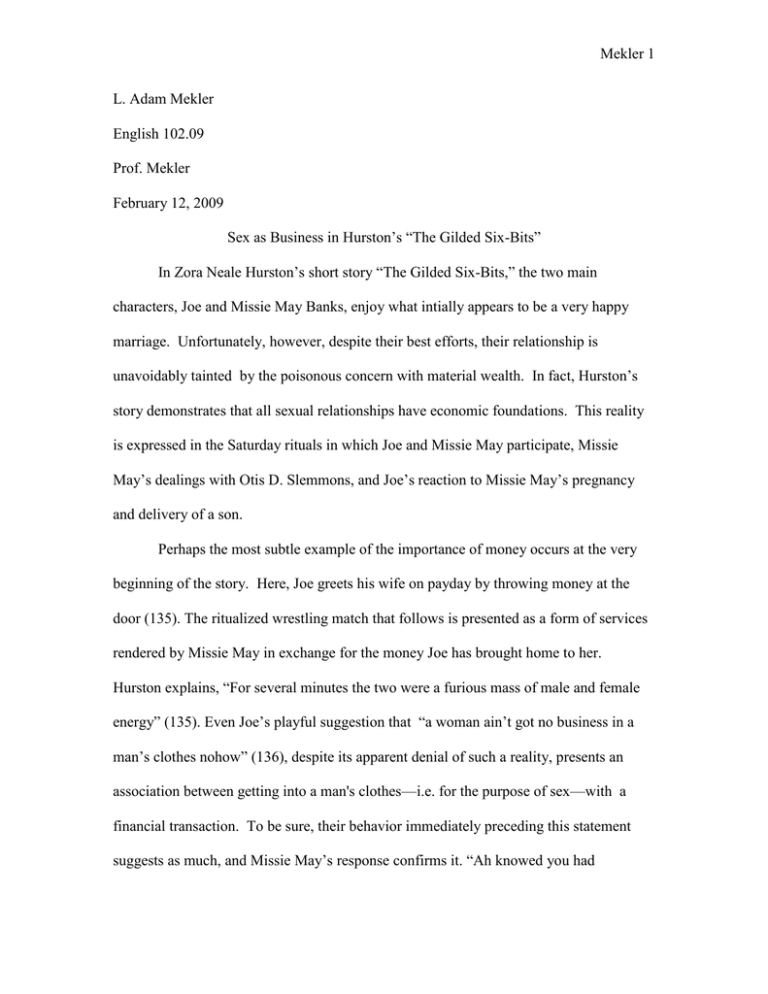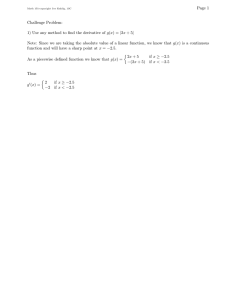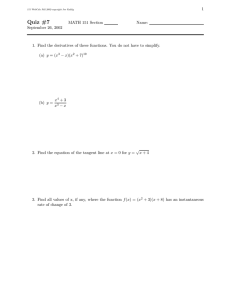
Mekler 1
L. Adam Mekler
English 102.09
Prof. Mekler
February 12, 2009
Sex as Business in Hurston’s “The Gilded Six-Bits”
In Zora Neale Hurston’s short story “The Gilded Six-Bits,” the two main
characters, Joe and Missie May Banks, enjoy what intially appears to be a very happy
marriage. Unfortunately, however, despite their best efforts, their relationship is
unavoidably tainted by the poisonous concern with material wealth. In fact, Hurston’s
story demonstrates that all sexual relationships have economic foundations. This reality
is expressed in the Saturday rituals in which Joe and Missie May participate, Missie
May’s dealings with Otis D. Slemmons, and Joe’s reaction to Missie May’s pregnancy
and delivery of a son.
Perhaps the most subtle example of the importance of money occurs at the very
beginning of the story. Here, Joe greets his wife on payday by throwing money at the
door (135). The ritualized wrestling match that follows is presented as a form of services
rendered by Missie May in exchange for the money Joe has brought home to her.
Hurston explains, “For several minutes the two were a furious mass of male and female
energy” (135). Even Joe’s playful suggestion that “a woman ain’t got no business in a
man’s clothes nohow” (136), despite its apparent denial of such a reality, presents an
association between getting into a man's clothes—i.e. for the purpose of sex—with a
financial transaction. To be sure, their behavior immediately preceding this statement
suggests as much, and Missie May’s response confirms it. “Ah knowed you had
Mekler 2
somethin’ fro me in yo’ clothes,” she tells him (136). The potential identity of this
“somethin’” is certainly not limited to the different items she pulls out of his pockets.
Indeed, the suggestion of either money or sexual gratification is a strong one in this
context.
The connection between sex and money becomes more explicit once Hurston
introduces the character of Otis Slemmons. During the course of their conversation about
him, both Joe and Missie May focus on his physical body. Missie May, for example,
asserts that Slemmons is “chuckleheaded” and has a “puzzlegut” (138), terms which are
meant to criticize him. However, Joe quickly defends Slemmons, explaining that having
a large stomach can be seen as a sign of material wealth, which in turn is associated with
sexuality. Slemmons’s claim that he has received his money from white women (139)
invokes traditional taboos against interracial sexual relations and casts Slemmons in the
role of the Black gigolo serving the needs of under-stimulated white women. This
position is swiftly reversed when Slemmons finally convinces Missie May to sleep with
him in exchange for his gold-plated coins.
Finally, Joe's relationship with Missie May changes as well after he discovers her
affair with Slemmons. Whereas his earlier throwing of money at her was a more
whimsical economic game, his “gift” of Slemmons’s coin to her after their first sexual
encounter is grimly serious. Hurston explains, “He had come to buy from her as if she
were any woman in the long house. Fifty cents for her love. As if to say that he could
pay as well as Slemmons. She slid the coin into his Sunday pants pocket and dressed
herself and left his house” (144). Missie May’s insulted reaction to Joe’s gesture
highlights the callousness of his actions. The separation between the two of them is
Mekler 3
further highlighted by Missie May’s consideration of the house as Joe’s (“his”), and no
longer hers, as she suggests earlier when she chastises Joe for “chunkin’ money in mah
do’way” (136). Interestingly, after Missie May delivers a son, Joe and she resume their
earlier positions, where Joe throws money at the door again and Missie May again calls
him out for “chunkin’ money in mah do’way” (146). In the end, then, the economic basis
of sexual relationships is best represented by the ability to produce important
commodities, such as male children.
Although Missie May and Joe have their moments of doubt, the strength of their
relationship is their love for each other. As a result, the economic realities of life, they
discover, are best kept as secondary, wrapped up in games and informality. When they
take money too seriously, the threat to their happiness becomes too real.
Mekler 4
Works Cited
Hurston, Zora Neale. “The Gilded Six-Bits.” Women Writers: Texts and Contexts:
“Sweat.” Ed. Cheryl Wall. New Brunswick: Rutgers UP, 1997. 135-46.
Print.
What is the main thesis of the paper? Does the author adequately support it?
Does the person stay on the original topic? Present a passage that does not seem
to belong and could be eliminated.
Find two examples of quotation in the essay. Present enough of the quotes so that
the writer knows which ones you mean.
o Does the writer properly cite the quotes?
o Do the quotes adequately fit in to the discussion where they are found?
o Do they support the writer's claims? Explain.
Are there parts of the paper that are difficult to understand? Explain.
What is the best idea in the paper? How could it be elaborated upon to make the
paper stronger?



